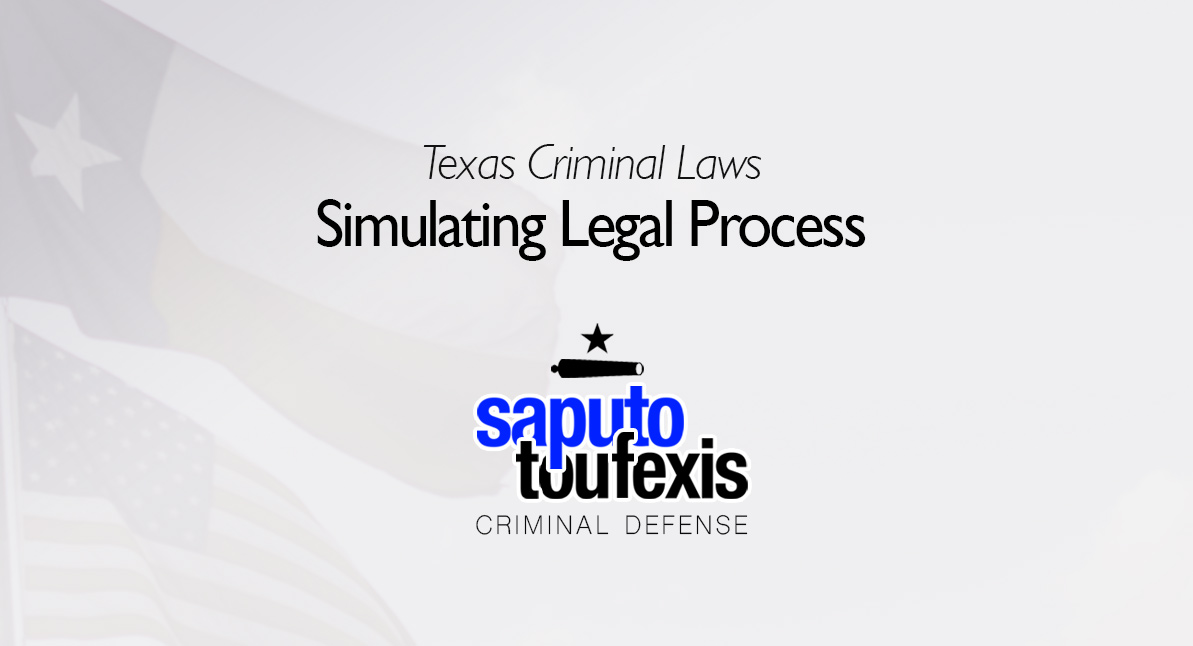The Texas Simulating Legal Process law gives police the right to arrest you if they believe you delivered (or caused to be delivered) a document that pretended to be a formal court document with the intent to get a payment or take any action or submit to the pretended legal authority.
FAQs about the
Simulating Legal Process law in Texas
- What is the current Texas law about Simulating Legal Process?
- What is the penalty for a Texas Simulating Legal Process offense?
- How can I be charged with a Simulating Legal Process offense in Texas?
- What is the statute of limitations for Simulating Legal Process in Texas?
- Can you get probation for Simulating Legal Process in Texas?
- What level of crime is Simulating Legal Process in Texas?
The Texas legislature codified this criminal offense in Texas Penal Code Section 32.48. The legislature did not update this law in 2025. In fact, this law has not been amended since 1997.
Have you been charged with Simulating Legal Process? Contact us today to discuss legal representation.
or Text or Call (888) 239-9305
However, in 2025 the legislature extended the limitations period for all Chapter 32 felonies, including felony versions of this offense, to seven years for conduct occurring on or after September 1, 2025.
The Penal Code classifies the Texas Simulating Legal Process law under Title 7 “Offenses Against Property,” Chapter 32 “Fraud.” Learn more about the Texas offense of Simulating Legal Process below.
What is the current Texas law about Simulating Legal Process?
AV Preeminent Texas lawyer Paul Saputo provides the current law defining Simulating Legal Process in Penal Code Section §32.48, as follows:[1]
(a) A person commits an offense if the person recklessly causes to be delivered to another any document that simulates a summons, complaint, judgment, or other court process with the intent to:
(1) induce payment of a claim from another person; or
(2) cause another to:
(A) submit to the putative authority of the document; or
(B) take any action or refrain from taking any action in response to the document, in compliance with the document, or on the basis of the document.
What is the penalty for a Texas Simulating Legal Process offense?
A conviction for Simulating Legal Process is punished by default as a Class A misdemeanor,[2] with a maximum possible fine under Texas state law of up to $4,000 and jail time of up to a year.
However, a conviction for Simulating Legal Process can be punished as a state jail felony if you have a prior Simulating Legal Process conviction.[3]
How can I be charged with a Simulating Legal Process offense in Texas?
You can be charged with Simulating Legal Process in Texas if the state’s attorneys believe that each of the elements of §32.48(a) as described in the section above have been met.
What is the statute of limitations for Simulating Legal Process in Texas?
Misdemeanor level Simulating Legal Process charges have a two-year limitations period.[4] Felony level Simulating Legal Process charges have a seven-year limitations period for offenses occurring on or after September 1, 2025.[5] For conduct before September 1, 2025, the limitations period for felonies is three years, the default felony limitations period under prior law, and the new seven-year period does not revive prosecutions already barred before that date.[6]
Can you get probation for Simulating Legal Process in Texas?
The Texas Code of Criminal Procedure allows both judges and juries to grant probation for Simulating Legal Process, and judges are also allowed to accept deferred adjudication plea deals.[7]
Note, however, that judges may not grant community supervision after a conviction if (1) the defendant used or exhibited a deadly weapon during the commission of the felony or immediate flight thereafter and (2) the defendant used or exhibited the deadly weapon himself or was a party to the offense and knew that a deadly weapon would be used or exhibited.[8]
What level of crime is Simulating Legal Process in Texas?
The Penal Code classifies the punishment for Simulating Legal Process as a Class A misdemeanor, but the state can seek an enhancement to a state jail felony by proving a prior Simulating Legal Process conviction.
Learn more about the penalty range for this offense in the section above.
Legal References:
^1. Texas Penal Code §32.48. This law is current as of 2025.^2. Texas Penal Code §32.48(e)^3. Texas Penal Code §32.48(f)^4. Code of Criminal Procedure 12.02(a)^5. Code of Criminal Procedure 12.01(3)(A), as amended by SB 2798, 89th Legislature (RS), Sections 1, 3^6. SB 2798, 89th Legislature (RS), Section 2^7. See Chapter 42A, Texas Code of Criminal Procedure, Art. 42A.054, Art. 42A.056, Art. 42A.102^8. Art. 42A.054(b), Texas Code of Criminal Procedure










